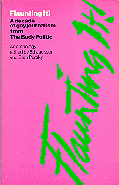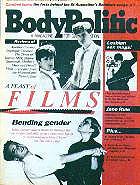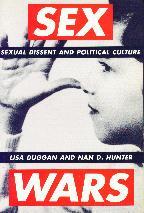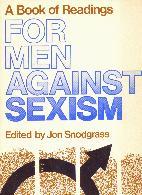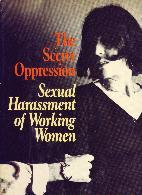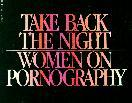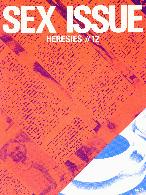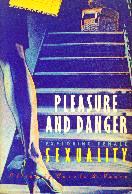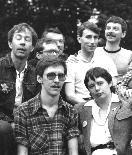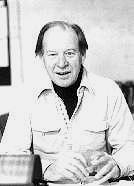|
Promiscuous |
|
Done a decade? Do a book.
Flaunting the best
|
Done lots of decades?
Do a constitution
(& a Charter of Rights too)
While effectively independent since the 1931 Statute of Wesminster, Canada got a fully homemade constitution only in Apr 1982, including The Charter of Rights & Freedoms, set to come into force by Apr 1985. For its birth & effects, see 1986: May - Dec. More extensive details are in What we demanded; What we got, in the section on federal human rights protection, on the CLGA site.
|
Fresh forces
Craig Patterson:
Edna Barker:
|
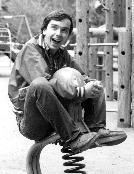
Child pornographer?
|
1982
January to May 30
Casting back in Toronto's gay history, looking for years to mark its major turns, 1981 would likely top the list. The bath raids -- and the massive resistance they roused -- were a watershed moment, one commemorated for years to come. But in the history of The Body Politic, in many ways inseparable from that wider history, certainly inseparable from my own life at the time, another year also stands out. It's this one, 1982.
This year we'd publish an anthology from the paper's first 10 years, naming it for Michael Riordon's column: Flaunting It! A Decade of Gay Journalism from The Body Politic. It would include an 18 page chronology of the Canadian gay movement's victories and defeats since 1964.
In the paper's own pages we'd enlist in the feminist "Sex Wars," looking at what had come to be called the "Big Four" issues: pornography, pedophilia, public sex, and sadomasochism. We would end up in court again this year -- twice: for the replay of "Men loving boys loving men" and for yet another article, touching on one of those four big issues.
We'd help host two big confabs, one national if with picnics, not plenaries, the other international and groundbreaking: it would be history's first global gabfest of lesbian and gay historians.
This was the year Canada got a constitutionally entrenched Charter of Rights and Freedoms (the 1960 Bill of Rights, a mere act of Parliament, had been largely ineffective). We barely noticed -- but in time the Charter would be central to gay rights victories across the country.
It was also the year when we were forced to notice a rare but frightening collection of diseases that, for most of 1982, had no commonly accepted name.
This was a year of new faces at The Body Politic, or if not quite new then rising to new influence. Craig Patterson, in English at the University of Toronto (he's Dr Patterson now, but we call him that only in fun), was brought to The Beep by a dose of clap.
He'd heard of Hassle Free Clinic, couldn't find it in the phone book, but thought it might be listed in The Body Politic. He headed to the Metropolitan Reference Library north of Yonge and Bloor -- and found at 4 Collier Street Glad Day Bookshop, a place central to many comings out. "So, within 45 minutes," he'd later say, "I got Glad Day, TBP, and Hassle Free." That was September 1980. By December he was at 24 Duncan, writing for the paper by early 1981.
Craig had first heard of TBP as a high school student out in suburban Rexdale, the "Men loving boys" mess reaching even there. He and his girlfriend Gillian Rodgerson talked about it then; by 1983 Gillian would also be working with the paper. Both would stay for years.
Edna Barker had been around since the fall of 1981 -- if not as Edna Barker. A professional editor, she was at first wary of using her own name. So she began as "Maggie Midd," a play on the in house name of the editorial group doing features and reviews, the middle of the magazine: hence "Midmag." Maggie didn't stay with Edna for long.
- "Every Thursday night I would pedal down to the BP office. I felt very safe there. But after a few months, I realized that I felt safe there because all the other people in that office were secure enough, in themselves, to use the names their mothers had given them.
"I began to crave stardom: I wanted to see my name splashed all over the pages of the paper. And soon enough it was. Well, at least it was in the paper -- in microscopic type at the bottom of a minuscule book review. And the world didn't come to a screeching halt. What the hell, I thought, and wrote another one. And told my mother."
By 1984 Edna would be on the cover, in leather, with a boy in a skirt. In her "Confessions of a Skirt Chaser" (no matter who was in one) she admitted a career goal: to be a go go boy at The Manatee. (It would close before she got the chance). Edna, the last person to call herself a "queer theorist," would pen some of TBP's most concrete challenges to the assumption that gender and identity are immutably fixed.
Her 1984 cover mate Danny Cockerline was another 1982 arrival, from North Bay, recruited from the gay group at Ryerson Polytechnic Institute when Chris Bearchell gave a talk there. Danny "hung around like a little puppy," as he put it, learning newswriting and radical sexual politics. Later he'd be a prostitutes' rights activist, his interest not academic: Danny would be a hustler himself.
He brought in his boyfriend David Chang, an artist originally from Jamaica, soon working in production, singing while he shot photostats. Danny's appearance on that 1984 cover was not accidental: it was his third. The first would be this year's September issue, with David, both playfully gorgeous.
Kevin Orr had first shown up in 1981 at TBP's regular December bash. He was working at Glad Day Bookshop but had had an earlier activist career with Gays of Ottawa, where he was the group's media spokesperson. "That was fine," Kevin later told me, "when I was doing radio or print -- so people couldn't see how old this person was" -- by that December, all of 19.
Nearly all these people were young, just Edna past her early 20s. Most Beepers were older: I was 32, John Allec, Chris Bearchell and Stephen MacDonald a bit younger, Gerald, Ed, Ken and others pushing 40. But we didn't start a youth column this time: the generational self consciousness of the late '70s seemed past. It would return, in particular for Danny in a New Wave anti clone phase.
But as Kevin would later say, speaking for most of that new young crew: "We were people who wanted to do adult things."
Kevin Orr soon faced things quite adult. Just weeks after becoming a newswriter for TBP, he became a news subject. On April 21 he was charged at Glad Day with "possession of obscene material for the purpose of sale" -- two relatively tame gay sex mags, nothing explicit and both on sale in other stores around town. Kevin faced a fine of up to $500 or six months in prison. Or both.
Again, the police seemed to have timed their action to TBP's press dates: the May 1982 issue had gone to the printers the day before. So, again, we got out another four page issue between issues -- we called them Newsbreak -- this one, like one before, published with the Right to Privacy Committee.
Craig Patterson and Danny Cockerline wrote most of it, along with Francis Gillis of the RTPC. It announced yet another defence fund, for Kevin's case, and a public meeting set for May 5. It also reported continuing, lower level police harassment.
- "Line ups at bars become more frequent as their gay owners try to deal with overcrowding charges. The heat's on hustlers and transvestite hookers. Bookstores are told to remove gay skin mags from their shelves. The frequency of arrests for alleged washroom sex increases dramatically.
"In singling out gay bars for overcrowding charges, the police know precisely what they are doing. They are attacking more than a place where people like to drink. They are attacking centres of communication, employment, and political action. The fewer the places where we can publicly congregate, the greater our isolation and invisibility."
Kevin himself was isolated. He was under charge without the company bath raid defendants could count on, most accused found-ins still awaiting trial, the RTPC there to help. We Beepers also awaiting trial -- or rather retrial -- had each other. Kevin had a small defence team, no co-defendants. He felt alone. In a few weeks he would not be. Quite.
|
The Sex Wars Tales of...
Sex Wars: Sexual Dissent
...& some battles in:
Got a stiffy? It's sexist!
No secret anymore:
Porn = Rape:
Bad Girls; Butch / Fem:
Radical feminists
Dialectics of desire:
|
LOOT
As noted earlier, there is a history of the Lesbian Organization of Toronto (the only gay group in Canada to get a book length study so far): Becki Ross's The House that Jill Built. But a few names & details may serve here.
LOOT formed in Nov 1976 & by Jan 77 had a home: 342 Jarvis St, a "former & norotiously lesbian household." The house harboured not only LOOT but the feminist mag The Other Woman (1972 - 77; Pat Leslie key among its collective) & a coffee house, The 3 of Cups.
Major LOOTers (some familiar at TBP): Rosemary Barnes, Nancy Adamson, Ruth Dworin (who ran Womynly Way), Fiona Rattray, Amy Gottlieb, Gay Bell, Val Edwards, Konnie Reich & Chris Bearchell.
324 Jarvis St was abandoned in May 1980. But its brief (if often fractious) time as a separatist dyke space fostered culture, activism, & the confidence many women carried into work with gay men.

Broadside
|
Making its début in May 1979, this feminist journal was almost entirely run by lesbians. Vital in its life for a decade: Eve Zaremba, Susan G Cole & Philinda Masters -- all, too, with LOOT.
Phil we saw often at TBP, bringing in copy to typeset. Eve was a tougher cookie: Ed Jackson called her (not to her face) ZA REM BAH! -- making it an Amazon war cry. Chris Bearchell did a piece on her in 1978 -- as a dyke detective novelist. Susan was an early anti porn feminist, often getting flak in our pages from pro sex dykes who called her "Susan G for God Cole."
For all that, the coexistence of Broadside & TBP fed a dynamic play of thought among worthy opponents. Broadside, too, was a collective, only Phil ever paid (to give it her whole life). It folded in 1989.
Mama Quilla II
This band marked the evolution of women's music -- from "womyn's" to "women's"; from '70s folk based sweet (if often polemical) to driving rock 'n' roll.
Susan Cole, coming back from the 1976 Michigan Women's Music Festival "dying to play music you could dance to" did gigs with Linda Jain, Sherry Shute, Susan Sturman & Linda Robitaille at The 3 of Cups as Mama Quilla II, named for Sara Ellen Dunlop's Mama Quilla.
Lorraine Segato, who'd been doing duos with Boo Watson, joined MQII in the late '70s with Laurie Conger (Susan had another band, No Frills). In '83 they teamed up with Queen St musicians, women & men, one of them drummer Billy Bryans, as The Parachute Club. Their 1984 "Rise Up", lyrics by Lynne Fernie (artist / filmmaker you'll meet in 1995) became an anthem of the era. In 1998 that anthem would be sold without the band's consent to back a commercial -- for McCain's "Rising Crust" pizza. They sued; McCain's desisted.
Today Susan Cole is an editor at the weekly Now. Lorraine Segato is still making music. At a party at Lynne's in Aug 1999 I saw them both, Eve Zaremba too, a rare pleasure every time. We yakked like old vets, & were: of the Sex Wars.
|
TBP's Trials Act Two
Seven + three = ten.
Plus One?
|
"Alan Miller & I run into Kevin Orr, just returning from pamphleting, Craig Patterson coming in too. Kevin sees me zipping up my jacket & tells me, no, you're not leaving now, are you? We steady up to the bar. ...
"Kevin kisses everyone & leaves. The lights go up. Last call was a long time ago."
Michael Wade
on a night at Buddy's.
For more on Billy Sutherland, David Roche, Tim Guest, & Sky Gilbert -- all of whom appear in Mikey's tale -- see Diva Diaries.
CHAT had seen the Sex Wars as early as 1972, when women sought gender parity among those running the group and then decided to cut out altogether -- as "The Cunts." Soon, few lesbian feminists could easily see gay men as allies: they were men, after all, the oppressor; best stay away from them. In 1976 LOOT was born, the Lesbian Organization of Toronto, firmly separatist.
A few in LOOT, notably Chris Bearchell, were willing to work with men but most were not. LOOT also separated itself from straight feminists -- in principle. In fact lesbians had long been central to the women's movement and weren't about to abandon the turf -- even, some dykes charged, at the cost of closetry.
New Year's Eve 1981 had seen a big benefit bash, for Womynly Way, a feminist concert promoter, Broadside, a feminist paper, and Mama Quilla II, "the hottest almost all women's band in town." That "almost" caused a ruckus: in the end no one male was allowed in -- not even the boy in the band. Chris Bearchell wrote about it in TBP's March 1982 issue.
- "Most lesbian feminists have been lesbian in private and feminist in public. The feminist movement has become so diverse even devotees have trouble keeping up with the changes. In recent years, lesbian feminists have begun referring to this multifaceted movement, and in particular their sector of it, as 'the women's community.' This name change has come about at a time when the isolation represented by lesbian separatism had begun to look like political suicide.
"Organizations and projects that were born and raised under the umbrella of lesbian feminism have come increasingly, to their credit, to see outreach and coalition building as keys to their effectiveness, even their survival.
"But 'the women's community' is a deceptive name. It's a way to avoid saying lesbian."
LOOT disbanded in 1980; Broadside, born in 1979 and produced mostly by women involved with LOOT, survived. It would until 1989, its feminists not above a bit of work with the boys.
The women who started it had come to The Body Politic for advice; for years it was typeset at TBP. From 1977 we ran PinkType, staffed mostly by women (Gay Bell, Amy Gottlieb, Pam Godfrey aka Godfree, Carol Auld) -- but often enough by Billy Sutherland, Merv Walker, John Allec; in a pinch by me.
Philinda Masters, Broadside's production manager, would say to me years later: "You always knew when we were going to get you. You typeset it!" We were respectful antagonists if, often, antagonists all the same. And with cause.
By the mid '70s feminism, even in the view of some feminists, had taken on a tone less of liberation than of regulation and control, eager to impose its own stern strictures on the lives of both men and women.
Concern with violence against women turned from the deeper social roots of abuse to a simpler target: pornography. Right wing forces found feminist allies in efforts to ban sexual imagery. Some feminists saw pornography as violent at worst, at least endorsing power unbalanced and abused. The right wing didn't worry about any of that: Sex was bad. Period.
Worries about power extended even to our sex lives: only the most egalitarian relationships were "correct." That automatically ruled out "pedophilia," the word coming to mean not just adult encounters with children but with people in their late teens. It also prohibited role playing: butch or fem, top or bottom or, especially, sadist or masochist.
In October 1980 the US National Organization for Women "reaffirmed" its commitment to lesbian issues by declaring firmly what were not lesbian issues. "Pederasty, pornography, sadomasochism and public sex" were, they said, about "exploitation, violence, or invasion of privacy," not "sexual preference or orientation." Thus the "Big Four" were born.
These strictures touched the lives of everyone wary of suspicion that their sexual practices might not jive with the politics of absolute equality. Even gay men: a 1977 Gary Ostrom cartoon showed a glum figure kicking a can: "It's no fun being a lesbian separatist trapped in a faggot's body."
"Male feminists" took on women's oppression by proxy -- too often as a guilt tripping brickbat for swatting fellow fags. John Stoltenberg, roommate of famous anti porn activist Andrea Dworkin, wrote in the 1977 collection For Men Against Sexism that "bone hard erections" are "good for rape. But the idea that they feel good -- that they are sensate -- is only a cultural illusion." His piece was called "Refusing to Be a Man."
But some refused guilty pleas or a sentence of enforced flacidity -- not out of male chauvinism, but in considered (even cautious) thought. In 1977 Andrew Hodges wrote:
- "I have come to question the assumption that there is one coherent group that can be described as 'gay people' or as 'lesbians and gay men.' ... Differences due to gender are just too great to be 'put aside.' Lesbians and gay men are oppressed in different ways, these differences being dictated by heterosexist society. Lesbians need economic and social equality as women for their own material survival, for one thing, which gay men do not. ...
"Of the many divergences here, sexual expression itself is a focal point and is currently drawing particular attention. Essentially gay males, by being males, have had the privilege of an environment in which sex positive attitudes can work out well. ... Women have not had this privilege, and justifiably are apt ro regard sexual liberation as simply an extension of male privileges.
"Progress will only be impeded by the sexist notion that gay men can organise and speak for 'gay people.' Polite silence will achieve nothing. A new dialogue must begin."
It did begin, if not resolving much. Chris Bearchell answered Andrew's "Divided We Stand" with "Gay Men and Lesbians Can Work Together." Despite our differences, she said, "we are oppressed by the same legal system, sometimes the same laws, and, more important, we are all oppressed in a hundred and one ways by the same ideology that has given rise to that system and those laws."
"What makes [Andrew] think," Chris asked, "that he can attribute a monopoly on striving for a 'sex positive attitude' to men? I'd wager that this is one lesbian whose 'sensibilities' are probably no more easily offended than Hodges's own." In the October 1980 issue Brian Mossop reflected on other sensibilities.
- "Feminism has arisen out of the situation of women in our society. That situation includes a system of gender roles, and a family institution based upon them, which I (like the gay male feminists) believe to be the reason both women and gays are oppressed.
"However, nothing follows from this about how to organize gay men.
"It is hard to imagine a movement of gay men getting anywhere without the fundamental bond of "men loving men" just as they are, with all the contradictions of people raised in a sexist society. To hate ourselves as men is as harmful as to feel guilty about being gay."
Brian called his essay "Gay Men's Feminist Mistake." Such reponses to "reverse sexism" were not (as some would be) "sexist" in the classic sense. Gay men like Andrew and Brian had worked with women, fought alongside them for rights -- most notably the right to abortion by choice -- that, superficially, seemed "not gay men's issues."
But they could resent (if rarely saying so) seeing our eroticism -- if not ours alone then distinct, vital, celebrated in gay male culture -- suppressed in attempted "solidarity" with women.
By now women, not just men, were resisting suppression of the erotic. Chris was not alone in declaring her "sensibilities" sturdy in the face of sex wet and wild. They'd long had to be firm indeed in the face of feminists fearful of female randiness. Among activist women, suspicion of "bad girl" sex gave rise to open charges of unorthodoxy, their lives effectively policed -- even self policed -- both in bed and beyond.
Not for nothing were all those identical plaid shirts, jeans and work boots at The Fly By Night. The uniform was certainly not "fem" and, though visibly "butch" by some standards, not butch in sexual intent (ostensibly, anyway: what other option did they have?). It was just how lesbian feminists were supposed to look. (Oddly, much like gay male "clones" of the time.)
This policing of style and sexual tastes had about as much effect on dykes in places like The Cameo Club as had radical gay politics on the denizens of The Parkside in the early 1970s. By the end of that decade dissident voices were rising, often working class and already quite familiar with attempts to regulate their sex lives.
In 1981 the feminist journal Heresies published a special "Sex Issue," among its articles one by Joan Nestle, a founder of the Lesbian Herstory Archives in New York. Joan defended the long tradition of role playing among gay women, not as a pathetic imitation of heterosexuality but as a distinctly lesbian form of erotic culture. She cited her own life in dyke bars of the '50s, coming out proudly as a fem. TBP reprinted her piece in its September 1981 issue, titling it "Butch / Fem and sexual courage."
That wasn't our first shot in the Sex Wars. In 1979 we did a run of articles on S/M, all by women, some celebrating it, others warning sisters away. A few gay men, Paul Trollope and Gary Kinsperson suspected among them, chimed in with a letter signed "The Bambisexual Liberation Front."
In the April 1982 issue we ran Gayle Rubin's "The leather menace: Comments on politics and S/M." It had first appeared in Coming to Power, an anthology by Samois, a lesbian S/M group in San Francisco. Ken Popert led off Gayle's piece when it appeared in TBP, saying in part:
- "It is a remarkable fact that the gay movement has had so little to say about the realities from which it takes its rise: sex among people of the same sex. Our dependence on the women's movement for theory and our desire not to give our opponents free ammunition have joined to starve us of any extensive discussion and interpretation of our sex lives.
"The areas of our sexuality which ought to be the subjects of our most satisfying discussions -- the ways in which our sex lives differ most from the established heterosexual practice -- have been isolated, assigned labels and thrust to the edges of our individual and collective consciousness."
Gayle Rubin, alas, dealt less with "the ways in which our sex lives differ most from the established heterosexual practice" than with people into S/M as yet another oppressed minority under siege -- by more orthodox homosexuals.
Sadly, she was right. A few weeks later a conference on women and sexuality at Barnard College in New York, featuring "pro sex" feminists, was trashed by Women Against Pornography, the place picketted, participants slandered, and the college pressured to confiscate the conference program.
Gayle had written: "The picture of S/M which is assumed in the current diatribes has almost no relationship to the actual experience of anyone involved in it." If her own article had also neglected "actual experience," some other things in the April 1982 issue did not. It was practically a theme number on S/M.
It was here Robin Hardy and Michael Wade wrote on "Master in Hell" Kenneth Anger. Edna, with Colin McEnery, a young dancer from New Brunswick and another newcomer this year, offered "The pleasure / pain Hit Parade," among its many titles "Two-fisted Love," "On Your Knees" and "He Hit Me (And It Felt Like a Kiss)."
On the last spread was a feature called "Lust With a very proper stranger," describing "the etiquette of proper fistfucking," as "refined as a foxhunt." It was by "Angus MacKenzie." A note explained that this was "the pseudonym of a Toronto writer who, for professional reasons, chooses to author this article anonymously."
Angus MacKenzie was in fact Norman Hay, MacKenzie his middle name. His informant, "a fisters' fister" he called him, was a friend in New York. His "professional reasons" involved work on a biography of his one time lover Alan Jarvis, his family not likely to be amused: that's Jarvis of Jarvis Street, the name going back to the very founding of this city.
The true identity of Angus MacKenzie would remain largely unknown for many years. And a good thing, too. On May 10, 1982, The Body Politic was charged with publishing obscene material. To wit: "Lust with a very proper stranger."
The "Lust bust" was a very proper raid. It came on the afternoon of Friday May 7, six weeks after the April 1982 issue had hit the stands. By then it was no longer on sale, the May number already out. There were just two cops; they stayed just 45 minutes, polite enough as they looked around.
One of them was Sgt Thomas Stephen who, just 16 days before, had busted Kevin Orr at Glad Day. Just 24 days later we were due in court for the retrial of "Men loving boys loving men." Some, needless to say, saw a connection. And there was: a new Crown attorney, Peter deJulio, had taken over that case and had ordered these 1982 raids on both TBP and Glad Day.
This time, we had not just gone to press, the June issue still in the works. It was put to bed on Thursday, May 20, only two days late. Its theme was kids again, meant as a lead up to the May 31 "Men loving boys" replay. The main cover draw was "Going back to growing up gay," a smaller one "Letters from high school," a boy identified only as "Robert" writing from Red Deer, Alberta. (In time Robert Barron would be in Toronto, and at TBP.)
That cover also carried a slash, top left: "Now obscene!" On the inside front cover there was the usual Free the Press Fund ad, this one featuring a big black box with two words in white: "Not again." Yes, again.
That cover slash had a smaller line: "Entire TBP collective charged for 'Lust.'" In our 1979 trial the Crown had been baffled by our management style, not sure who might be responsible for what -- so this time they took no chances.
On May 10 all nine of us then listed in the masthead as collective members were charged. We lined up behind Clayton Ruby for a press conference that day and in the June issue ran a picture of the lot of us: Roger Spalding, Ed Jackson, Stephen MacDonald, John Allec, Chris Bearchell, Gerald Hannon, Tim McCaskell, Ken Popert, and myself.
We nine accused soon adopted another: Kevin Orr, becoming "The Obscenity 10." In the June issue's masthead no contributors were named. Instead it said: "We are all Angus MacKenzie." At a demo on May 15 Michael Lynch tried turning it into a chant. It flopped: nice sentiment; lousy rhythm.
We might have been The Obscenity 11, but the cops failed to find Angus. Norman spent nervous days. Robin Hardy, often with him, later recalled them cruising Norman's apartment from a passing streetcar, trying to see if anyone had got in. For quite some time Norman was afraid to go home.
We were afraid that the Crown might drop charges against one of us to force testimony about his identity. Each of us had to ponder what refusal might cost: a contempt charge, maybe a jail sentence. Gerald said he envisioned waving bravely goodbye as he was packed off in a paddywagon. But we'd have to wait until the trial, set for November, to see if such fantasies played out.
There wasn't much news on the bar front this year. TBP's March issue carried an ad for Christan's in Yorkville -- "The best bar by far: Disco, New Wave, Afterhours, Restaurant"; the usual bumf, but then: "Greeks separate the men from the boys ... with a crowbar." In just months it was gone.
Drakes, promoted as "a restaurant, piano bar, cruise bar" also in Yorkville, came and went in a flash. The Mainstage and its VS Restaurant announced itself down at King and Sherbourne with a full page ad in the April issue. Its ads shrank and soon it, too, faded away.
Hotel California had opened earlier this year at Jarvis and Gerrard, "featuring The Outpost," appealing mostly to cowboys and leathermen. It would have a more stable career, lasting until early 1984. The space's next tenant, The Surfboard Tavern, tried for a lesbian clientele but soon failed.
In December we'd see the first "gay night" at an otherwise straight club, Twilight Zone at 185 Richmond East. In time we'd see many more, their crowds mixed, young, and transitory.
But there was always Buddy's. Here's an evening there, an extended one and rather typical of the times: a demo, for Kev and The Beep, was set for the next night.
- Michael Wade's journal, Friday, May 14, 1982:
"You can't go into the bars these days without hearing people talk about court cases. Certain words filter through the chatter and you realize we've all become experts in legal jargon.
"Alan Miller stops me to give me the news that there's a large blue van outside the bar filled with queerbashers who hiss and make noises every time someone walks in or out of the place. Don't leave right away, he tells me. I'm angered at being held hostage by the contempt of the worthless, and Alan and I discuss how we think Saturday's demo will go, if this blue van is an omen.
"I go over to the bar for another beer and run into Billy Sutherland [with the Sisters of Perpetual Indulgence, doing agitprop as gay male nuns] who has just bought a pattern, he tells me, for a new habit to wear at the next GCDC dance: Very modern, downtown corporate office skirt, short and unpleated. He'll use grey material for it and try to get hold of some grey pantyhose.
"I suggest, although I know the idea is hackneyed, black fishnet. Billy disagrees: it would distract from the skirt, he tells me; it's important that the outfit be an ensemble. How about bare legs then, very fashionable. But no: too much hair. As he leaves with a friend I warn them of the blue van outside. Billy just scoots out, laughing.
"Alan returns and announces he's going home. I decide to go with him. At the door we run into Kevin Orr, just returning from pamphleting. I see Craig Patterson coming in too, and I wave hello to him.
"Kevin sees me zipping up my jacket and tells me, no, you're not leaving now, are you? And Alan asks me if I have a bike and I tell him that I don't, that I was going to walk him to the TTC [the city's transit system]. No, I tell Kevin, I'm not going home, then. Kevin and I steady up to the bar to join some other people.
"I look over and see David Roche sitting there and I put my hand on his shoulder and push him to get his attention. We smile.
"David tells me he was thinking about me today and I tell him that I think of him every day. I do a lot of vacuuming at work, I tell him, and I often find myself looking at piles of bread crumbs and limp parsley on the floor and thinking, what would David Roche do in this situation? David was thinking of me while he was writing a cleaning manual. He imagines I'm in the other room and he's shouting out instructions to me. It helps him to think linearly.
"I ask him if his cleaning manual is going to be an 'artist's book.' Yes, he says, an art book. No, I say, an artist's book à la Tim Guest. Ah yes, he says, an artist's book, yes, that's what it is. [David, living in the same collective house as Tim McCaskell, was a performance artist, his piece "Dirt is My Profession" about housecleaning. For a living he actually did clean houses.]
"We talk about his shows. I tell him I want to write an article on him some day, but I can't think of which local magazine might publish it. He can't make it to Saturday's demo because he's got a play and a party that night. It's a Sky Gilbert play. I order another beer and go off on a diatribe criticizing Sky Gilbert's work.
"Kevin Orr kisses everyone and leaves. The lights go up. Last call was a long time ago. David and I leave together and I'm so involved in talk that I forget to check for the blue van."

Squirrel:
|
- Letter to Jane Rule, May 30, 1982:
I hardly need tell you what a pleasure it was to finally get to meet you after these past years of correspondence. I especially liked the scene that quietly developed in the office while you were here; what began as just two or three of us sitting at our tattered sofa became a circle that gathered up almost everyone in the office, and even a few who drifted in while you were there.
It had been a crazy day, as you know, and that quiet scene was very reassuring and warm, including as it did some of the old hands like Ken and Gerald and Chris as well as some of the new, bright young faces I'd been mentioning, like Victor, and Danny, covering the phone. And you. It was one of those little scenes that help to remind me what all the chaos is for.
I had told Jane about Victor Bardawill: small, darkly handsome, quiet except when he barked (literally: "Woof!") while pecking away at the typesetter. And peck he did: Victor set the entire Flaunting It! anthology, edited by Ed Jackson with Stan Persky in Vancouver, 300 pages densely packed. Very densely, Victor a maniacal copy fitter, his typographic precision soon legendary.
He often keyed himself into the masthead as "Squirrel" -- or Victor Brat, Victor Rooster, Vox Victrola; even as "a beastly unpleasant person who makes animal noises and listens to Julie Andrews records."
Victor not only listened to Julie Andrews but could imitate her; she wasn't the limit of his repertoire. Eddie was quite taken with him, as was I, once recording his performance in a note to Michael Wade:
- I stayed at the office helping Victor and Gerry Oxford stuff subs (see what I do when you're not around to get me out of there?), and we got into singing lots of old Sixties hits and Broadway show tunes at the top of our lungs. Little Victrola did imitations of Sophie Tucker and Billie Holiday and got all flushed and twinkly eyed, smudges of ink from the papers all over his face.
Jane and I wrote nearly every month. (To this day we still do.) It had begun in early 1981 when I took over editing of her work for the paper from Gerald Hannon. It was just routine editorial business at first, but soon we were going on and on to each other about everything.
That gave me back something I had lost by the mid 1970s: an ongoing record of my life; concrete evidence to aid -- and correct -- my memory.
From here on, you'll see lots of letters to Jane.
Go on to 1982: May 31 through December
Go back to: Contents page / My Home Page
This page: http://www.rbebout.com/bar/1982a.htm
December 1999 / Last revised: June 18, 2003
Rick Bébout © 1999-2003 / rick@rbebout.com
